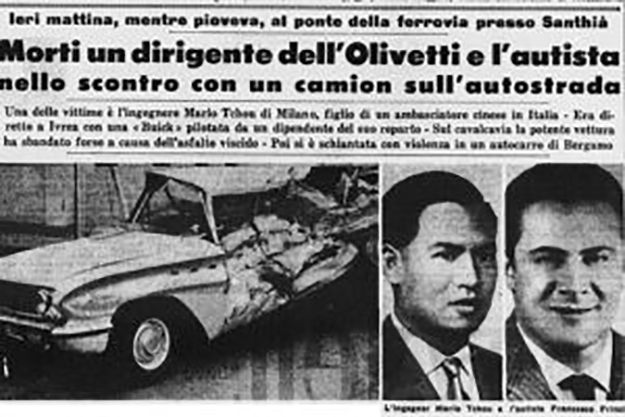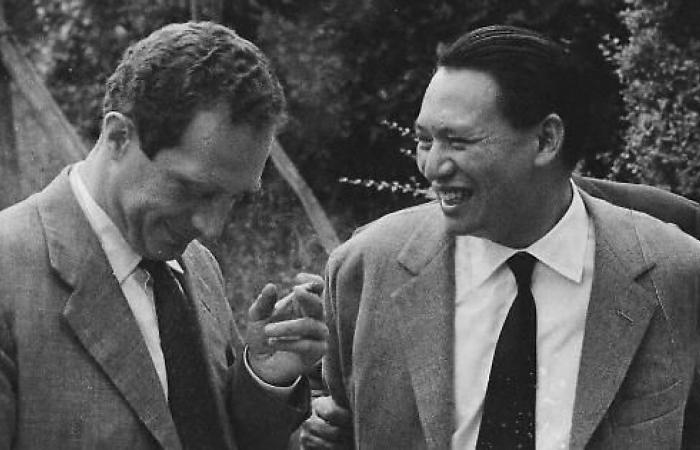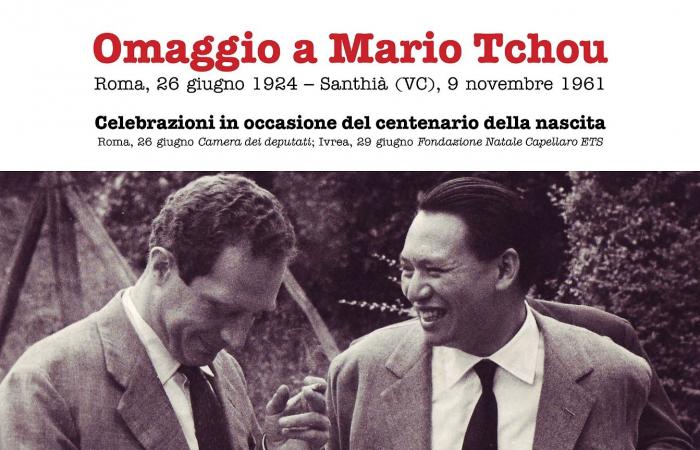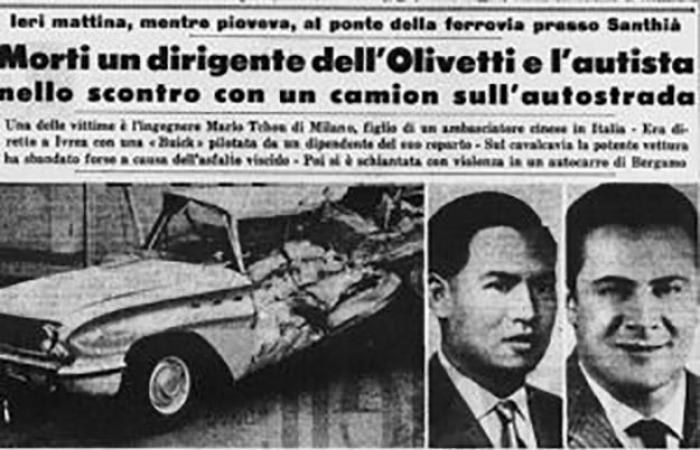In December 2021, with an article written by “angry” people we wondered why in Prato, a city with a strong presence of Chinese, in 2020, the city council had unanimously approved a motion to name a street after Mario Tchou and in Ivrea there had never been a mention of him.
Well?
Sometimes it happens and it happens that the On 29 June, in Ivrea, a plaque will be unveiled on the occasion of the centenary of his birth. The celebrations will start on June 26th in Rome at the Chamber of Deputies and in Ivrea a series of initiatives will be organized by the Natale Capellaro Ets Foundation, by the Association Ivrea in Rome and by the Association Olivetti Historical Archive and hosted by the Museum – Laboratorio Tecnologic@mente in Via Giuseppe Di Vittorio 29.
Born in Rome on 26 June 1924, son of the Chinese Evelyn Wauang and the diplomat Yin Tchou, an official serving at the Taiwanese Consulate to the Holy See, Mario Tchou he obtained his classical high school diploma at the Liceo Ginnasio Torquato Tasso in Rome.
He then continued his studies at the University of Rome in electrical engineering and, thanks to a scholarship in the USA, in 1947 he obtained the “Bachelor of electronical engineering” at the Catholic University of Washington.
He moved to New York and began teaching in 1952 at the prestigious Columbia University. He was 28 years old.
Adriano Olivetti in 1955 he brought him to the company and entrusted him with the task of forming a working group, in collaboration with the University of Pisa, to design and build an all-Italian electronic calculator, using 150 million lire, a huge sum for the time. And it dates back to 1957, the Elea 9003 marketed in around 40 examples.
Mario Tchou he died together with his driver in a car accident on the morning of November 9, 1961, at just 37 years old, on the Milan-Turin motorway overpass, just before the Santhià toll booth; the car, driven by its driver Francesco Frinzilost control after overtaking, crashing into a van.
That morning Tchou he was going to Ivrea to discuss the project of a new transistor architecture.
The sudden death, a year after that of Adriano Olivettidecreed the end of the Elea project and closed an important season for Italian electronics, which at the time saw the industrial and technological leadership of Olivetti.

The electronics division was in fact dismantled and sold to General Electric in 1964.
The wife of Tchou She said “His death and that of Adriano led, in a short time, to the divestment of the Electronics Division of Olivetti, the flagship of our country, which was quickly sold to General Electric. Yes, that was a conspiracy, entirely industrial and financial, aimed at weakening Olivetti and Italy and doing the Americans a favour”.
In 2013 Carlo De Benedetti declared on a radio program: “In Olivetti there was the belief that he had been killed by the American secret services”assuming that the accident of Tchou had been provoked in some way to favor IBM.
It is clear that Olivetti and Italian electronics as a whole have suffered a huge blow with the loss of two key figures of Made in Italy innovation of the time.

But there is obviously something else to say…
When we talk about Olivetti and its founders, of Camillo and of Adrian.
When we travel to the country that invented the PC and surpassed all possible competitors in the IT sector when IT didn’t really exist yet.
When we transform an entire neighborhood into a UNESCO heritage site and tell the whole world about it.
Well, when we do all this, what we try to do is forget how it all ended.
The truth is, we don’t know.
If she was interested, however, Meryle Secrest born in Bath in the United Kingdom but resident in Washington in the States.
She is one of the most successful American biographers, winner of the prestigious award in 2006 “Presidential National Humanities Medal”.
Among his books, published by Rizzoli, there is also “The Olivetti Case” and the mysterious end of the first personal computer in history. Translated into Italy for the first time in November 2020, it is the story of the first Italian “multinational” present not only in Italy with 5 factories, but also in England, Spain, Brazil, Argentina and the United States for a total of 25,000 employees. The dream of a company that looked at productivity but also at the well-being of workers.
A dream that shattered on the morning of February 27, 1960 with the death from “cerebral congestion” of Adriannear the small station of Aigles in Switzerland, on board a train that left Arona station and headed for Lausanne.
From here onwards the doubts.
Why wasn’t an autopsy done on the body?
The minimum wage for a man who had dared to challenge the giants of the nascent American industry in a sector, namely information technology, born overseas for military needs linked to the Cold War.
To reinforce the suspicions that even today no one has ever taken it upon themselves to unravel, the death of the engineer came nine months later (strange combination or astral conjunction). Mario Tchouwhich occurred in a road accident on the Turin-Milan motorway, near the Santhià toll booth.
Hired in 1954, the engineer Chouson of the Chinese ambassador to Italy, where he had also completed his studies, was a brilliant researcher and Adrian he wanted him with him to head the IT division and, above all, to develop the first electronic calculator.
Two deaths that are even more suspicious if you consider that he died in the same years Enrico Mattei pointed out for his collaborations which were inappropriate for the “Allies” but advantageous for Italy with China, Egypt and Russia.
Without mincing words, while for the plane crash that in Bascapè, on the evening of 27 October 1962, put an end to the life of the founder of Eni, the malicious origin was proven in the prosecutor’s investigations Vincenzo Caliano one said a word about Adriano and Mario.
The epilogue?
In 1960 Fiat, Banca IMI, Centrale, Mediobanca and Pirelli entered the share capital (coincidentally all companies that had benefited from the Marshall plan) and some time later the Electronics Division of Olivetti was sold to General Electric.
Adriano and Mario: two deaths that beheaded and decreed the death of the company.
Olivetti’s problems, at least according to the author of the book, probably have a starting date: 1959. It was in that year, in fact, that Adrian acquires control of the American Underwood. A sort of revenge on that Mr. Underwood who in the past he had not considered Adrian not even worthy of a meeting, considering him nothing more than a small Italian entrepreneur. The US government didn’t like this. He attempted to file a lawsuit to prevent the acquisition, only to then abandon the legal action without any explanation.
In truth, the United States would have already begun to closely control Olivetti since the 1950s with the triumph on the world markets of the “Lettera 22” awarded with the “compasso d’oro” in 1954 and judged, in 1959, by the Illinois Institute of Technolgy, the best design product of the century.
And then again when he posed in direct competition with the US giant IBM, arousing the suspicions and attention of the American secret services. Attention that became very high when, just 18 months after its entry into the IT sector, Olivetti reached and surpassed IBM with the P101 calculator, sold in 40,000 units, some even ended up at NASA which used them to plan the Apollo moon landing 11.
In the book of Meryle Secrest there is a story about a company that at a certain point sought financing in Russia and China.
From here on, the suspicion that the CIA was behind the deaths of Adriano and Mario becomes something more than a simple supposition.
After all, Adriano Olivetti was an uncomfortable character even in Italy where he was not well liked by fellow entrepreneurs due to his social policies in favor of employees and the working conditions that prevailed in his factories.
Many have tried over time to discredit the idea of an American conspiracy, but how can we not see a parallel in current affairs with the recent American positions on Huawei (the Chinese smartphone giant) and on Tik Tok, on China and about Taiwan, the Russians and Ukraine?
Except that unlike then, tariffs and war are preferred to murders.
INSIGHTS BY GIUSEPPE RAO
The Dream of Tchou and Olivetti beyond the frontiers of technology 2021
The challenge to the future by Adriano and Roberto Olivetti 2004
The challenge to Olivetti’s future sixty years later 2018
Mario tchou olivetti elea 9003 Limes 2008









